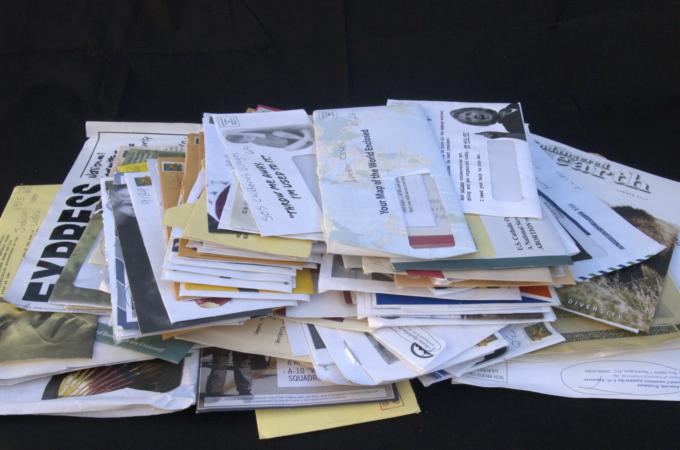Unrequested religious mailings
Q. I receive, on a daily basis, mailings from multiple religious organizations requesting monetary help. Often they include address labels, holy pictures, prayers cards, etc.
I feel guilty just trashing them, so I collect them and when the pile gets big, I mail it to one of the organizations, hoping that they will know how to dispose of them. But this gets costly and, as a senior citizen, I have a limited income. Please let me know what I can do. (Cranbury, New Jersey)
A. I know exactly what you are talking about because I get these mailings myself -- dozens of them. What I do is this: Occasionally, if I like a particular prayer card, I pull it out and keep it for future reference. Once in a while, I send a small financial donation if I think the organization is particularly worthy. But most of the time, I simply throw the whole packet in the wastebasket.
Nearly always, the sponsoring organization is doing worthy work -- often missionary activity -- and this is one of the few ways they have of raising funds. But you are certainly within your rights, both legally and morally, in disposing of the material. You never requested these items, and they are not blessed.
To expect the recipient, especially an elderly person of modest means, to bear the cost of returning them would be unreasonable and unfair. (One alternative, I suppose, would be to offer such items to your local parish for use in their catechetical program, but you are not bound to make that effort.)
What you might want to do is to write a quick note to each of the sending organizations saying something like this, "I know that you do good work, and I appreciate it, but I no longer wish to receive mailings from your organization. Please remove my name from your address list.")
Q. Recently I attended a youth Mass in another diocese, which was celebrated by an elderly priest, assisted by a deacon. The priest was evidently infirm, and at Communion time, the priest retired to a chair while the Eucharist was distributed by several of the students as well as by the deacon.
The deacon, who was the only ordained minister, held the cup -- over toward one of the side aisles. My understanding is that, if both a priest and a deacon are distributing Communion, the priest is to offer the host, and the deacon the chalice.
So in this case, with the priest incapacitated, it seemed to me that the only "ordinary" minister (the deacon) should have distributed the consecrated host -- and from the main aisle, the most prominent position. Am I being overly critical? (Albany, New York)
A. Your question is a good one, and I'm not sure there is a simple and certain answer. The guidelines of the U.S. Conference of Catholic Bishops for Masses with a deacon say -- as you point out -- that the deacon "assists the priest celebrant in distributing Communion, especially as minister of the precious blood" and that "if Communion is given under both kinds, the deacon ministers the chalice."
So it seems a logical extension -- in the situation you present -- that the deacon would distribute the host. But I'm not sure that there is any firm rule to that effect.
In our parish -- where, at large weekend Masses the priest is assisted by seven extraordinary ministers of holy Communion -- I occasionally choose to hold one of the chalices as a way demonstrating that the precious blood is just as much the Eucharist as the host is.
By the way, your mention of students distributing Communion raises this point I find interesting: There is no universal church law on a minimum age for extraordinary ministers; bishops are free to set their own guidelines, and dioceses in the U.S. vary widely -- from 15 years of age to 25. All agree that these should be regularly practicing Catholics who are living a life consistent with Catholic moral values.
- - -
Questions may be sent to Father Kenneth Doyle at askfatherdoyle@gmail.com and 40 Hopewell St. Albany, N.Y. 12208.
- Father Kenneth Doyle is a columnist for Catholic News Service



















